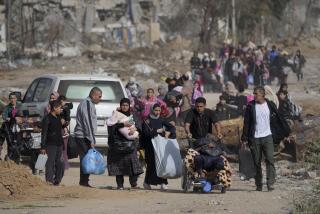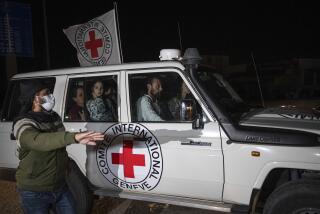No End to the Violence in Najaf
- Share via
NAJAF, Iraq — The U.S. military clashed with forces of rebel cleric Muqtada Sadr as negotiations to end the standoff at one of Shiite Islam’s most revered shrines remained stalled Sunday.
U.S. tanks approached within several hundred yards of the Imam Ali Mosque, where Sadr’s supporters were holed up. Militants from his Al Mahdi militia skirmished with U.S. and Iraqi forces in the surrounding city throughout the day and into this morning.
Elsewhere in Iraq, surging violence claimed the lives of soldiers, civilians and businessmen. Micah Garen, a kidnapped U.S. journalist, was released. And a website linked to an Islamic militant group showed images of 12 Nepalese the group claimed to have kidnapped in Iraq.
The standoff at the Imam Ali shrine has become one of the most delicate challenges for the interim government of Iraqi Prime Minister Iyad Allawi. Any attack on the mosque compound risks inflaming Iraq’s Shiite majority.
But capitulating to Sadr would probably be seen as a sign of weakness for Allawi’s government, which is trying to establish control over the war-torn country before elections planned for January.
Iraqi government officials have alternated between tough talk of an attack and offers of continued negotiations. “Time is running. We cannot wait forever,” Ministry of State Kasim Daoud said Sunday.
Sporadic fighting continued around the shrine area, but it remained unclear whether U.S. and Iraqi forces would launch an assault on the mosque. Sadr aides said the shrine’s western wall suffered some damage in fighting early today.
On Sunday, the U.S. military appeared to focus on clearing out nearby areas, including the shrine’s expansive cemetery, the narrow streets of the surrounding Old City and the nearby town of Kufa, a Sadr stronghold.
The peace talks have had little effect on military operations. “We are continuing operations to reduce the Mahdi army strong points,” said Maj. Bob Pizzitola, executive officer of the 1st Battalion, 5th Cavalry Regiment.
As recently as Friday, there was hope that control of the shrine would be handed to Iraq’s top Shiite religious figure, Grand Ayatollah Ali Sistani, who is in London for medical treatment. But the two religious leaders have not been able to agree on terms of a hand-over.
The U.S. military base on the northern edge of Najaf was bustling Sunday, after several days of relative calm. Squads of armed soldiers used a collection of tents as a stand-in for the streets of Najaf, practicing mock attacks. Throughout the day, helicopters buzzed overhead and scores of armored vehicles were at the desert camp.
On Sunday night, Iraqi police drove through the city announcing on megaphones that Sadr had fled to northern Iraq. Although Sadr has not appeared in public for a week, it seemed improbable that he had fled to northern Iraq, a mostly Sunni area dominated by ethnic Kurds. The announcements may have been a new tactic to try to persuade Sadr supporters to leave the shrine.
Elsewhere, the U.S. military announced the death of six troops.
Five U.S. Marines died Saturday in Al Anbar province in western Iraq -- one in combat, three from injuries sustained during operations and a fifth in a vehicle accident.
A bomb attack Sunday evening against a U.S. convoy west of Mosul in northern Iraq killed one American soldier and wounded another, military officials said. Two Iraqis were injured in the blast, including a child. An ambush two hours later in Mosul left three private contractors dead, a Filipino and two Iraqis. An Indonesian was injured, hospital officials said.
Including the most recent deaths, more than 950 U.S. service members have died in Iraq since the invasion in March 2003, according to the U.S. Defense Department.
The Iraqi Health Ministry reported that eight Iraqis died in military actions around the country Sunday, and 42 were wounded.
In southern Iraq, Sadr representatives announced that Garen, a French American journalist kidnapped Aug. 13, had been freed. The 36-year-old freelancer, whose work has appeared in the New York Times, was released late Sunday along with his translator, Amir Doshe, according to Al Jazeera television and other media outlets. U.S. Embassy representatives could not immediately confirm the account.
Last week, Garen had appeared on a video aired on Al Jazeera, kneeling and surrounded by five armed men who identified themselves as members of the Martyrs Brigade. The men said that Garen would be killed unless U.S. troops withdrew from Najaf.
Sadr aides had applied pressure for his release, including making a public appeal for his freedom during Friday prayers.
“I am very grateful to everyone who worked to protect me and guarantee my release, and I thank my friends in Nasiriya and my family and fiancee who spent three months with me in Nasiriya,” Garen told Al Jazeera by phone from Sadr’s office in Nasiriya.
Three other missing journalists, an Italian and two French, are also thought to have been kidnapped. All three disappeared while headed toward Najaf this month to cover the siege of the gold-domed shrine.
Meanwhile, a group calling itself the Army of Ansar al Sunna announced Sunday on its website that it had kidnapped the 12 Nepalese in retaliation for their cooperation with U.S. forces. The men were shown holding passports, though Nepalese officials have not confirmed their identities.
Nepalese Minister of State for Foreign Affairs Prakash Sharan Mahat urged the group to release the men.
Lawlessness also seemed to be spreading in areas under the control of Sadr’s Al Mahdi militia. In Amarah, nearly 150 prisoners escaped from a city jail, Police Chief Ismael Arar said. He said the prisoners walked out of their cells after reaching some agreement with Iraqi guards; 82 inmates were later captured.
Suspected Al Mahdi militants had also seized convoys with food shipments headed to Baghdad from Basra. They began releasing the trucks Sunday, a Trade Ministry spokesman said.
Sanders reported from Najaf and Miller from Baghdad. Times special correspondents Roaa Ahmed in Mosul and Othman Ghanim in Basra contributed to this report.
More to Read
Sign up for Essential California
The most important California stories and recommendations in your inbox every morning.
You may occasionally receive promotional content from the Los Angeles Times.










